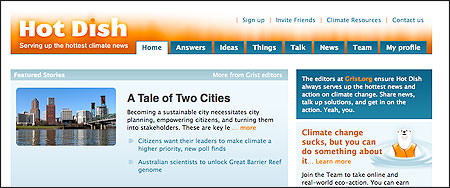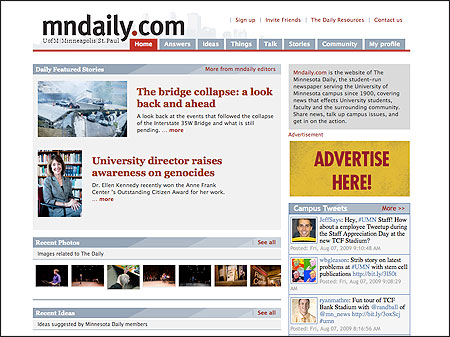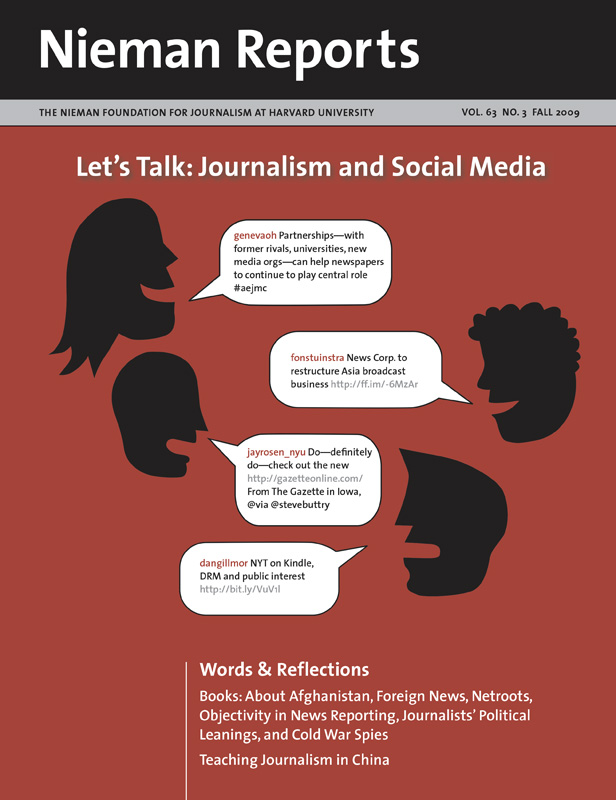Like many young people her age, Jackie, who is 18, admits that she’s not one to put pen to paper, turn the pages of The New York Times, or devour a paperback on a lazy summer afternoon. Yet on a Thursday morning before school, she logged into Hot Dish, a youth-oriented Facebook app that serves up “the hottest climate news.” For Jackie, it’s a go-to social media site within her Facebook network. She goes there, she told us, to “check in to see what articles other people had posted and to read their comments” on thoughts she had shared. Once there, she reads stories about climate change, comments on them, and easily shares news with her friends. She calls this site her “everyday RSS habit,” a place she goes to read and post.
Counter to the decline in young people reading anything printed on paper—whether news or books—is a notable increase in out-of-school online reading and writing through fanfiction (at fanfiction.net, for example) and social networking sites. Yet, according to The Pew Research Center for the People & the Press, more than one third of people under 25 get no news on a daily basis. Yet, teens spend many hours each week online—a recent British study estimated the number at 31—especially on Facebook, which is the most-trafficked social media site in the world.
We wondered if young people could be persuaded to critically engage in reading news and conversing about it on Facebook. Would doing this provide them with a sense of community? Furthermore, would their involvement translate into real-world actions or consist solely of virtual activism? And, if we understood better how young people decide how to handle, produce and talk through information online, would we be any closer to knowing how to develop successful media-rich and educational environments?
With these questions and goals in mind, in 2008, with a generous grant from the John S. and James L. Knight Foundation, we embarked on a pioneering social media experiment. Our goals were:
- To create and launch two cutting edge Facebook news community applications
- To discover which strategies work best to engage 16- to 25-year-olds in current events and information
- To understand how to deliver educational materials in innovative and effective ways
- To build community through social media.
The Experiments Begin
In previous research (done by Greenhow) on young people’s learning and literacy within social network sites, it was found that teens and tweens are Facebooking for more than just informal socializing, pet photography, the occasional “thumbs-up,” tag, or diatribe. They are also “Faceworking,” a term that Neil Selwyn, a sociologist at the London Knowledge Lab, coined this year. The word describes what happens when people intentionally put their social networking site to work, for example, when they seek or promote information, problem-solving, peer-sharing, and creative inspiration.
If we want to inform, educate and mobilize an engaged citizenry—as the vision for active participation in solving 21st century challenges—then we need to make sharing news and experiences fit easily into young people’s lives. Most importantly, we need to measure the success of our efforts.
In a meet-them-where-they-are spirit, we developed Facebook applications to provide young people with the ability to easily do the following:
- Post news stories and articles they write to a niche network within Facebook.
- Vote up stories that others write.
- Write blog entries and comments.
- Interact with other users on online discussion boards, chats and Twitter.
- Earn points for engaging in these and other activities.
As a way to observe community involvement and patterns of use and to collect information for our research, we developed software to track, record and archive the users’ activities. When all of this was in place, our two community-focused Facebook applications were launched—Hot Dish and MN Daily. The MN Daily was created to supplement the University of Minnesota’s student-run paper, The Minnesota Daily, and its Web site, mndaily.com.

Using grant money from the John S. and James L. Knight Foundation, Greenhow and Reifman developed Hot Dish, a Facebook application focused on news about climate change. Users receive points for sharing stories and blog posts; the user with the highest point total wins a trip to the Arctic.
Hot Dish
Climate change issues garner international attention. But as fewer youths engage daily with current affairs than did a decade ago, there are questions about how to engage them in keeping up with news about these issues. So we created Hot Dish, an online community where those interested in environmental issues can share articles, learn about climate change, take action online and in the physical world, and win eco-conscious prizes.
Launched on February 27, 2009, Hot Dish’s features encourage reading, writing and sharing information and experiences. The Seattle-based online magazine Grist.org provides environmental stories daily. Those who come to Hot Dish participate in challenges where they can earn points for civic engagement and local activism, such as writing a letter to the editor, writing lawmakers, starting a recycling program, or recycling old electronics. The most active user wins a trip to the Arctic.
At its peak, Hot Dish attracted about 5,000 active monthly users, including 150 Facebook fans. By midsummer, it had 1,157 registered members, and in a two-month period between March and May, 346 Hot Dish participants (ages 16-25) joined its action team. During this time, users posted and shared 3,600 news stories, wrote more than 2,200 comments and blog entries, and completed 1,800 eco-challenges.

As part of a research study to find out if young people would read news, converse about it on Facebook, and be motivated to get involved, MN Daily on Facebook was launched in March 2009.
MN Daily
Launched on March 29, 2009, The MN Daily on Facebook is a place where users receive campus-related stories from The Minnesota Daily and other sources. Here they can sign up to become members of the Daily Action Team, earn points for reading, writing and sharing online or for participating in their community. As with Hot Dish, users can redeem those points for prizes. As of midsummer, The Daily on Facebook had 1,123 registered members and 155 had signed on to the action team. A bump in membership is expected when classes resume in the fall.
Learning What Works
In both cases, we’ve been steadily collecting data from surveys, focus groups, in-depth interviews, and online usage patterns. Our analysis of these data is ongoing, with results from these Facebook experiments expected this fall and publication anticipated in the spring or summer of 2010.
Here are two insights based on our preliminary findings and review of other studies:
- General agreement exists that there might be efficiencies in locating niche media-sharing communities within existing social networks, such as Facebook.
- Findings indicate that niche social media are doing a better job than other sites and forms of online community in catalyzing youth-initiated conversation.
As we analyze our findings, we’ll discover how much they adhere to or expand on this previous research. For now, we have more questions than answers. What forms of digital media literacy do young people need to fully and critically participate in opportunities for engagement? Does the existence of new ways of transmitting news and information within existing social networks encourage habits of news tracking and civic engagement among young people? If so, how and what can we learn from tracking the patterns of sharing within their community of friends? How might insights from youth-initiated public dialogue and debate be fed back into the framing of these issues? How could these online youth experiences inform the ways that the news media produce and distribute their content to make it more engaging for those who are growing up in the era of Facebook?
These are key questions that both educators and journalists might be asking themselves as they think about how to connect their job of informing with the notion of transforming the ingestion of news into the actions of public engagement.
Christine Greenhow, a Harvard-trained learning technologies researcher affiliated with the University of Minnesota, is a visiting fellow at Yale University’s Information Society Project and member of the Harvard-MIT-Yale Cyberscholar Working Group. Jeff Reifman is the founder of NewsCloud.com, where he works on news aggregation and community technology. He is also a freelance writer and former Microsoft and MSNBC group program manager.

